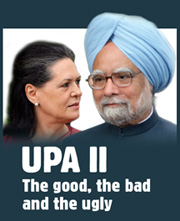 T V R Shenoy continues our week-long look at the United Progressive Alliance's second anniversary in power.
T V R Shenoy continues our week-long look at the United Progressive Alliance's second anniversary in power.
A house divided against itself cannot stand.' (Though the quotation is often attributed to Abraham Lincoln it is actually a metaphor coined by Jesus Christ.)
As the first year of the United Progressive Alliance-2 draws to a close it is tempting to spend the rest of this column throwing brickbats and the occasional bouquet. But let us look instead to the year that is drawing ahead.
Three major states go to the polls at some point in the next twelve months, namely Kerala, Tamil Nadu, and West Bengal. The United Progressive Alliance probably has better-than-even chances of gaining or retaining power in each of the three assemblies; I am not so sure, however, of how the Congress shall fare. Given that the Congress is the largest constituent of the UPA that may seem a bit of a paradox, but do take a look at the details.
The Trinamool Congress is second only to the Congress itself in the United Progressive Alliance when it comes to numbers in the Lok Sabha. But the fact is that the alliance doesn't seem cemented as much as held together with staples and tape.
Mamata Banerjee's party refused to vote alongside the Congress when the Rajya Sabha voted on the Women's Reservation Bill, it objects to a whole host of Congress-proposed legislation like the Land Acquisition Bill, and there have been various public spats over the best way to tackle the Naxalites.
Most recently both parties have announced that they shall fight the local body polls in West Bengal independently. (This followed the Trinamool Congress's decision to offer the Congress only 25 of Kolkata's 141 seats.) But fighting separately is a decision that can benefit only the Left Front.
Would it not make far greater sense to shelve the infighting until the Left Front is removed from power in the Writers' Building in Kolkata? Or are the problems greater than those caused by bruised egos?
Whatever the answer the spectacle of such constant bickering offers little reassurance of good governance should Mamata Banerjee indeed become chief minister of West Bengal.
While there may indeed be differences of principle between the Congress and the Trinamool Congress there is nothing so high-minded when you sail across the Bay of Bengal to Chennai. To put it in the simplest, most brutal terms, a section of Congressmen believes that many of their DMK partners are just too greedy for their own good.
All parties have money-making machines hidden away somewhere. (That is true all over the world, not just in India.) Many politicians harbour dynastic ambitions. (That too is not limited to our country.) But the trick lies in knowing just where to draw the line -- and a lot of Congressmen believe that the DMK is ignoring the danger signals.
The worst part -- from the Congress perspective anyhow -- is that the alliance seems to be a one-sided bargain. The DMK wants its pound of flesh at the Cabinet table in Delhi but refuses to grant a single chair in Chennai. (This despite the fact that the DMK has only 99 MLAs in the 235-strong Tamil Nadu assembly and is dependent on the 36 Congress MLAs to sustain itself in office.) This state of affairs is not designed to promote harmony.
The Congress's chances of getting a chief minister from its own party run the gamut from 'limited' to 'hopeless' in West Bengal and in Tamil Nadu. In Kerala, however, everyone is predicting a United Democratic Front sweep in the next assembly polls, with a Congressman certain of the chief minister's chair.
This is taken for granted to the extent where even some of the CPI-M's partners in the Left Democratic Front are hoping to jump over before the polls. Therein lies the problem for the Congress, because the various factions of the Kerala Congress hope to unite under the UDF's umbrella, potentially creating an 'ally' simultaneously too strong and too undisciplined.
The first step was taken on 30 April when the P J Joseph faction left the LDF to merge with the K M Mani group (part of the UDF). This was hailed by both sides but the Congress reaction has been marked in its lack of enthusiasm.
But there is a strong case for believing that the Congress's problems with its UPA allies pale into insignificance when laid against something else. When Lincoln spoke in 1858 he did so as a warning that civil war was about to break out. Could it be that it is not just the UPA but the Congress itself that looks like a house divided?
Senior Congressmen -- party functionaries, if not ministers -- have publicly lambasted the Union home minister for his policies dealing with the Naxalites. If you thought Digvijay Singh's and Mani Shankar Aiyar's fulminations were aberrations, how would you describe Sonia Gandhi herself saying that the 'root causes' of Naxalism need to be addressed?
Again, it is no secret that the party and the prime minister do not always see eye to eye on foreign policy, particularly on the sensitive issue of negotiations with Pakistan. Nor for that matter on some of Dr Manmohan Singh's economic policies.
The BJP and the CPI-M, which are technically the two major Opposition parties, are a confused lot today, searching for causes. The Congress has little to fear from either. But it has much to fear from the public shenanigans with its own allies -- and more so if the party and the government cannot be harnessed together.
Voltaire said it best: 'I can take care of my enemies, but God save me from my friends!'
Part I of the series: UPA II is proving even worse than UPA I





